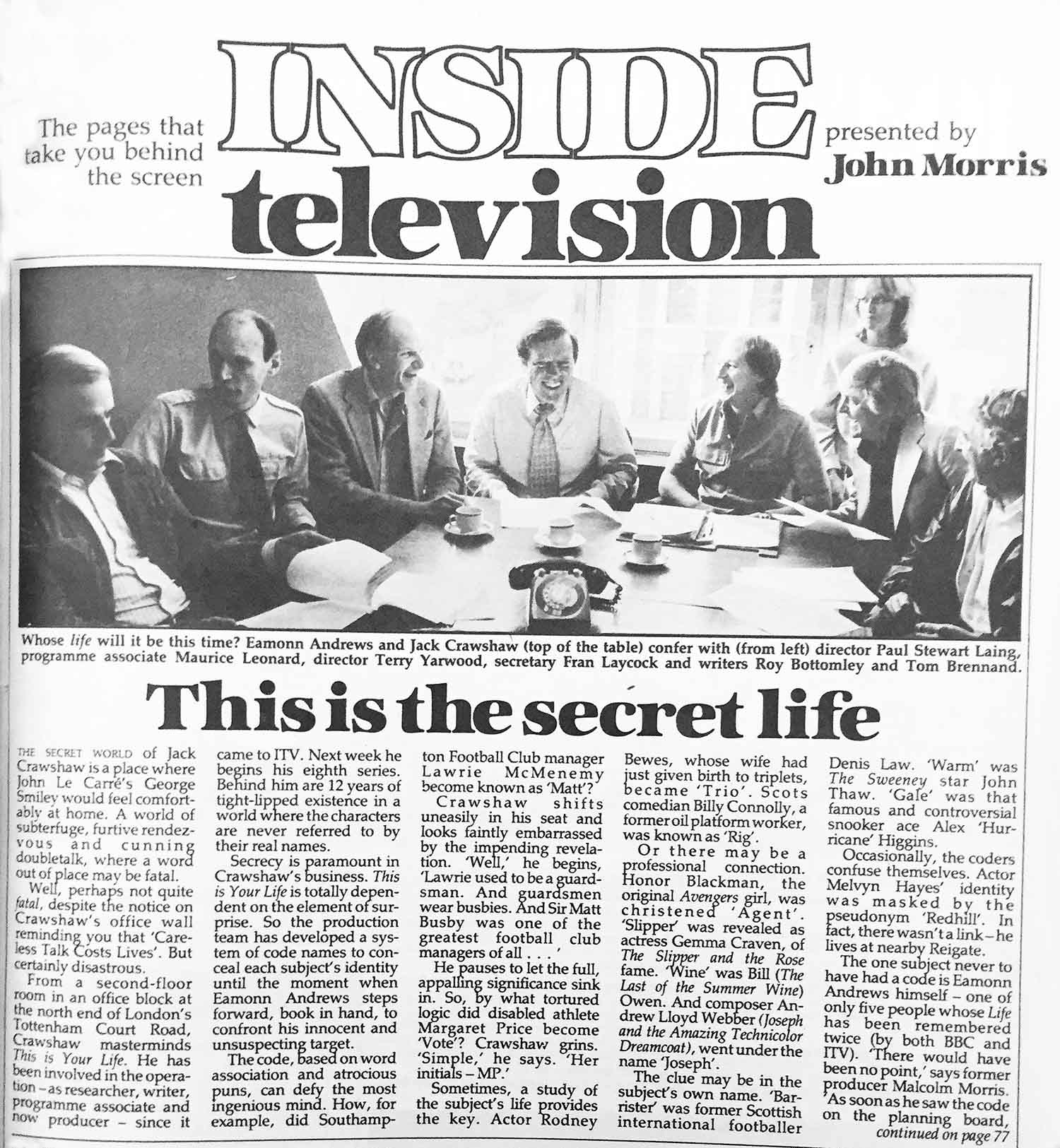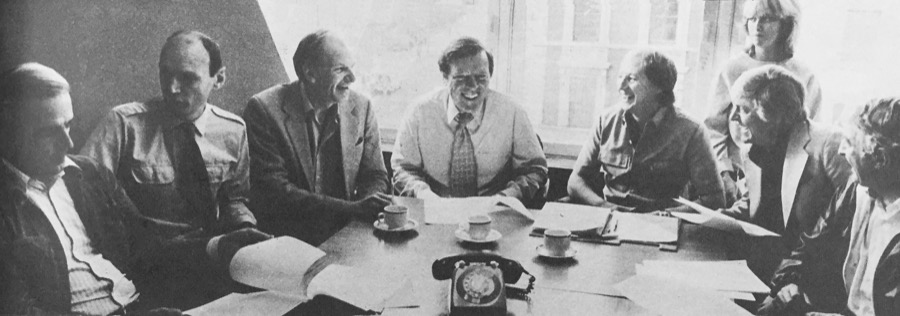Big Red Book
Celebrating television's This Is Your Life
3 October 1981

the producers who steered the programme's success
surprised again!
the researcher's story
The secret world of Jack Crawshaw is a place where John Le Carre's George Smiley would feel comfortably at home. A world of subterfuge, furtive rendezvous and cunning doubletalk, where a word out of place may be fatal.
Well, perhaps not quite fatal, despite the notice on Crawshaw's office wall reminding you that 'Careless Talk Costs Lives'. But certainly disastrous.
From a second-floor room in an office block at the north end of London's Tottenham Court Road, Crawshaw masterminds This Is Your Life. He has been involved in the operation – as researcher, writer, programme associate and now producer – since it came to ITV. Next week he begins his eighth series. Behind him are 12 years of tight-lipped existence in a world where the characters are never referred to by their real names.
Secrecy is paramount in Crawshaw's business. This Is Your Life is totally dependent on the element of surprise. So the production team has developed a system of code names to conceal each subject's identity until the moment when Eamonn Andrews steps forward, book in hand, to confront his innocent and unsuspecting target.
The code, based on word association and atrocious puns, can defy the most ingenious mind. How, for example, did Southampton Football Club manager Lawrie McMenemy become known as 'Matt'?
Crawshaw shifts uneasily in his seat and looks faintly embarrassed by the impending revelation. 'Well,' he begins, 'Lawrie used to be a guardsman. And guardsmen wear busbies. And Sir Matt Busby was one of the greatest football club managers of all...'
He pauses to let the full, appalling significance sink in. So, by what tortured logic did disabled athlete Margaret Price become 'Vote'? Crawshaw grins. 'Simple,' he says. 'Her initials – MP.'
Sometimes, a study of the subject's life provides the key. Actor Rodney Bewes, whose wife had just given birth to triplets, became 'Trio'. Scots comedian Billy Connolly, a former oil platform worker, was known as 'Rig'.
Or there may be a professional connection. Honor Blackman, the original Avengers girl, was christened 'Agent'. 'Slipper' was revealed as actress Gemma Craven, of The Slipper and the Rose fame. 'Wine' was Bill (The Last of the Summer Wine) Owen. And composer Andrew Lloyd Webber (Joseph and the Amazing Technicolour Dreamcoat), went under the name 'Joseph'.
The clue may be in the subject's own name. 'Barrister' was former Scottish international footballer Denis Law. 'Warm' was The Sweeney star John Thaw. 'Gale' was that famous and controversial snooker ace Alex 'Hurricane' Higgins.
Occasionally, the coders confuse themselves. Actor Melvyn Hayes' identity was masked by the pseudonym 'Redhill'. In fact, there wasn't a link – he lives at nearby Reigate.

Whose life will it be this time? Eamonn Andrews and Jack Crawshaw (top of the table) confer with (from left) director Paul Stewart Laing, programme associate Maurice Leonard, director Terry Yarwood, secretary Fran Laycock and writers Roy Bottomley and Tom Brennand.
The one subject never to have had a code is Eamonn Andrews himself – one of only five people whose Life has been remembered twice (by both BBC and ITV). 'There would have been no point,' says former producer Malcolm Morris. 'As soon as he saw the code on the planning board, he'd have asked immediately, "Who's that?"'
The team covered up by inventing a fictitious doctor. To maintain the pretence, the 'doctor' was also supplied with a make believe family.
Such secrecy, Jack Crawshaw insists, is essential: 'If the intended subject found out, there'd be no show, no matter how costly the project.'
The planning stage can be lengthy. 'It took us six years to get Gary Sobers' Life on screen,' says Crawshaw. 'We wanted him in the first series – after all, he was without doubt the world's greatest cricketer. But he was simply never in the country.
'Then we discovered, at last, that a visit would coincide with a run of the series. By then he'd been knighted, and it was a far better story.'
'By contrast, we can put a show together in a few days. Take Robin Cousins. When he returned to Britain as World Olympic and European skating champion last year, he was almost a folk hero. His home city of Bristol had planned a civil reception, and I thought it right that we should pay our tribute. I know he was young, but he'd packed more into his short life than some 70-year-olds.'
Ideas are put forward at Thursday morning conferences, attended by every member of the production team – Andrews, Crawshaw, directors Paul Stewart Laing and Terry Yarwood and their two personal assistants, programme associate Maurice Leonard, writers Tom Brennand and Roy Bottomley, programme organiser Judy Webbe, no fewer than six researchers and three secretaries.
Anyone can suggest a subject, but, says Crawshaw: 'We expect them to convince us that the story and timing are right.'
'If we feel the time is right, and that we've the wholehearted co-operation of the family, we start digging deep. Who has played a major role in the subject's life? Who would the subject like to see? That's an important point – we want the subject to look around at the after-show party and think, "If I could have written the guest list, for a party to celebrate my life, these are exactly the people I would have chosen."'
The series has been criticised, perhaps mischievously, because the guests have only good things to say. Crawshaw defends the approach: 'It would hardly be fair to the subject otherwise. After all, we're springing the surprise on him or her, and saying, in effect, "Put yourself in our hands – and trust us."'
The biggest problem is that someone will blow the gaff. 'The whole of the programme is based on trust,' Crawshaw admits. 'From the start, we warn people, "If you don't keep the secret, we probably won't have a show." But we insist the responsibility shouldn't be a burden. We'll do the worrying.'
'And if they feel that they simply have to confide in someone, that's OK by us. After all, it's a party we're planning – not an arrest.'
Crack the code and win a prize
Can you crack the This Is Your Life code? Here are 10 of the code names used in the last series – and the 10 personalities they fit. If you can work out who's who, you could win a copy of Who's Who on Television, worth £4.95.
Ten copies of the hardback version of this book, a fully illustrated guide to 1000 of the best-known faces on British television, published by ITV Books and Michael Joseph, will go to the senders of the first 10 correct entries opened.
CODENAME:
1 Bar
2 Chair
3 Dan
4 Found
5 Hale
6 Lad
7 Manor
8 Margaret
9 Midnight
10 Stitches
SUBJECTS:
J Joe Loss
For instance, if you think 'Chair' refers to Janet Brown, write 2-C. Complete all 10 answers and send them, on a postcard, to: TV Times Magazine Who's Who Competition, PO Box 40, Market Harborough, Leicestershire LE16 9NJ, to arrive by first post on Friday 16 October.